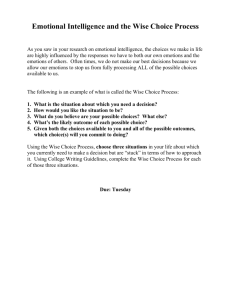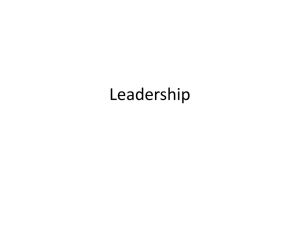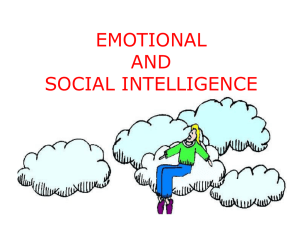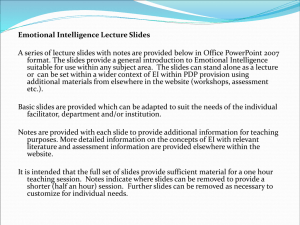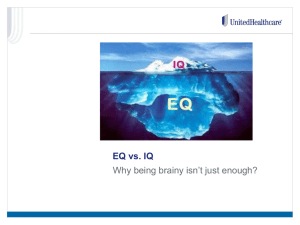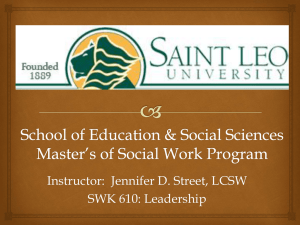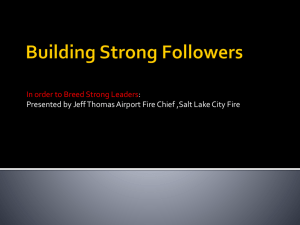Emerging Leadership Forum Leadership Attributes
advertisement
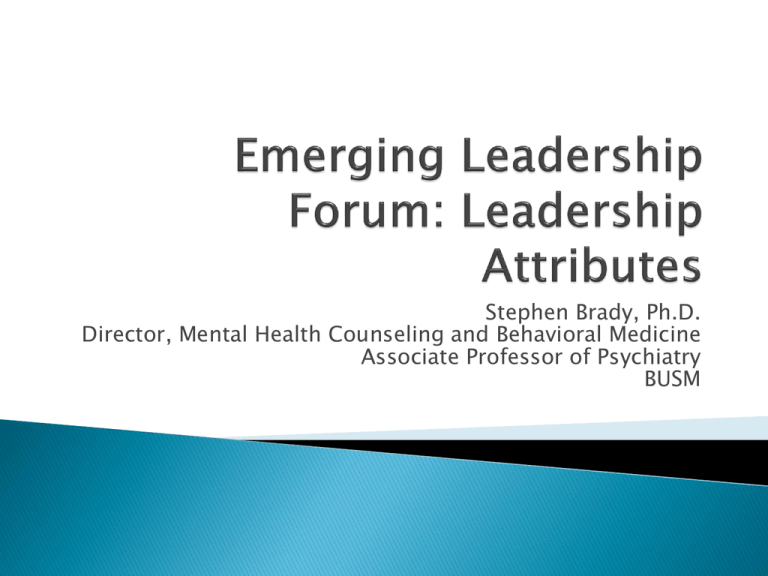
Stephen Brady, Ph.D. Director, Mental Health Counseling and Behavioral Medicine Associate Professor of Psychiatry BUSM To discuss the results of the Sixteen Personality Factor Questionnaire (16PF) To understand how leader attributes impact performance To describe how situational variables impact leadership To identify a comprehensive model of leadership Our Focus: Career Development Report Most of you received several reports including Practitioner, Manager & Career Development Thoughts about the results? Factor Analysis of primary components of personality (Raymond Cattell) Copyright 1993 by the Institute for Personality and Ability Testing 185 Items with 16 primary personality variables Psychometric properties include; internal reliability averages .76 with a range of .68 to .87, test-retest at .80 for 2 weeks and .70 for 2 months Global Factor Scale Descriptors ◦ ◦ ◦ ◦ ◦ Extraversion Anxiety Tough-Mindedness Independence Self-Control Moderately Extraverted Moderately Anxious Tough-Minded Independent Lower Self-Control Warmth Reasoning Emotional Stability Dominance Liveliness RuleConsciousness Social Boldness Sensitivity Vigilance Abstractedness Privateness Apprehension Openness to change Self-Reliance Perfectionism Tension Problem Solving Resources Coping with Stressful Situations Interpersonal Reaction Styles Organizational Role and Work Preferences Career Activity Interests Being aware of emotions Identifying your own emotions Identifying others emotions Managing your own emotions Managing others emotions Using emotions to problem solve Expressing emotions adaptively Leader's Operating Environment Social Appraisal Skills Cognitive Abilities Personality Motives Values Distal Attributes Problem Solving Skills Expertise Tacit Knowledge Proximal Attributes Emergence Leader Processes Effectiveness Advancement & Promotion Leadership Criteria From: “Leader Traits and Attributes”, by S.J. Zaccaro, C. Kemp & P. Bader , 2004, in J. Antonakis, A.T. Cianciolo, and R. J. Sternberg (Eds.), The Nature of Leadership (pg.122), Thousand Oaks, CA: Sage. Copyright 2004 by Sage Publications. How one formulates, makes and acts on decisions Synthesis of wisdom, intelligence and creativity (WICS) Some aspects of these traits may be modifiable, flexible and dynamic (Sternberg, American Psychologist, 2007) Create a sense of mission Motivate others to join them on the mission Create an adaptive social architecture for their followers Generate trust and optimism Develop other leaders Get results (Bennis, American Psychologist, 2007) Unrealistic-Optimism Egocentrism what I want) (I am so smart and effective I can do (I am the only one who matters, not the people who rely on me for leadership) Omniscience (I know everything… and as a result you do not recognize your limitations) Omnipotence (I am so powerful I can do what I want) Invulnerability (I can get away with anything because I am too clever to be caught) Moral Disengagement (Ceasing to view leadership in moral terms but only in terms of what is expedient) (Bandura, 1999; Sternberg, 2007) Wise leaders skillfully balance the interest of all of the stakeholders, including their own interests, those of their followers, and the organization. They also recognize the need to align the interest of their group with those of other stakeholders. Wise leaders understand that what might appear to be a prudent course of action over the short term may not be so over the long-term (Sternberg, 2007) There seems to be moderate correlation between intelligence and leadership effectiveness (Riggio, Murphy & Pirozzolo, 2002; Spreitzer, McCall & Mahoney, 1997) Academic Intelligence is necessary but not sufficient Must also have practical intelligence Cognitive complexity & flexibility Social intelligence Emotional intelligence Adaptability Openness Tolerance for ambiguity (Zacarro, 2007) Do not define a problem the way everyone else does Are willing to analyze whether their solution is best Sell their solution Recognize how knowledge can help and hinder creativity Take sensible risks Are willing to surmount obstacles Believe in their ability to accomplish the task at hand Tolerate ambiguity Find extrinsic rewards for things they are intrinsically motivated to do Continue to grow intellectually Effectiveness is impacted by situational factors not under leader control Situations shape how leaders behave Situations influence the consequences of leader behavior (an effective leadership style in one situation may not be in another) Leadership depends upon the situation Leadership is a process not a person The process involves motivating others Incentives…both intrinsic and extrinsic matter Collaboration in pursuit of a goal “Great Things” are in the minds of leaders and followers and may not be desired by all Followers play an active role in constructing leadership relationships Empowering the leader and influencing behavior Determining the consequences of the leadership relationship Successful leadership may be understood as the fit or match between a leaders traits, style and orientation and follower maturity and situational challenges (Avolio, 2007) Briefly describe your leadership style What could get in the way of you being a wise leader? What is one concern you have about being a leader. What do you want feedback about? How do you understand the influence of biology, psychology and social factors and leadership? How might leadership skills differ for Scientists, Practitioners, Administrators across settings? Stephen Brady, Ph.D. Director, Mental Health and Behavioral Medicine BUSM sbrady@bu.edu

